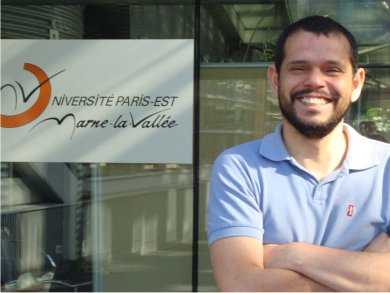Administrative Matters and Housing
When we go to live in a foreign country, there are a lot of things to deal with: accommodation, resident permit, health insurance, bank account, documents to bring along … The list is long and the checklist can be painfully difficult if you have no help. Fortunately, University Paris-East supports foreign researchers by means of the International Office of Invited Researchers (Bureau International des Chercheurs Invitées, BICI). Even before they arrive in Paris, BICI provides them with practical information and administrative help. The people at BICI know all the protocols to follow and the best alternatives available to foreign researchers, which makes our arrival much easier. BICI actually saved my life and I had no problems concerning all the bureaucratic matters. If you plan to live abroad and have no BICI to smooth your way, prepare yourself …
Although everything was okay for me, I am going to talk about the specific questions involving the choice of the place to live …
Of course, everybody knows that living in Paris is not cheap. So it is necessary to consider the alternatives. BICI have a database of apartments to rent where I could search for a place. This can be the easier route since BICI mediation avoids some bureaucratic barriers. However, the apartments were not so attractive, nor were the rates. Like other tourist cities, Paris offers many possibilities to find housing. The internet is, for sure, a useful tool; there are websites dedicated to looking for a housemate or finding furnished apartments, non-furnished apartments, lofts or studios in all districts of Paris and the suburbs. Believe me, you can spend hours on the web.
In my case, another possibility was Cité Internationale Universitaire de Paris (CIUP), a housing complex in southern Paris designed for foreign students. CIUP comprises several buildings, each one reserved for a specific nationality. There, I could live in the Maison du Brésil (Brazil house), where the rates are ok and the vacancies are reserved for Brazilian researchers and PhD students who come to Paris for a research period. Maison du Brésil presents an excellent infrastructure and provides perfect conditions for someone who has just arrived in town. Besides, as 80 % of the Maison du Brésil residents are Brazilians, adapting is much easier. The culture shock is not so hard and you feel yourself “protected”. Not to mention that with every problem you face, it is likely that someone else has already faced it and will offer advice and help. At the same time, you are able to keep in touch with people from countries with cultures very different from yours. It really sounded great.
However, there was a downside. Living together with people from your own country, you can be over protected and are less exposed to the real lives of the “natives”. It can be even worse if you do not have a workplace to go to every day. Another important point (perhaps the most one …) is the language. As everyone can imagine, without speaking the language we are not able to live the lifestyle of the country, get to know the people and enjoy and take advantage of this experience. Living closely with your fellow countrymen, you speak very little of the host country language. Every single activity you do is with people who speak your mother tongue. It is a comfortable zone and you have to really persevere to break away and expose yourself to the local culture. Of course, it depends entirely on the individual. However, to refuse the simplicity the CIUP offers and live like the natives it is necessary to devote a great deal of time and energy.
I already knew this, even before arriving in Paris. I got a room at Maison du Brésil, but I planned to only live there only temporarily. My idea was to look for an apartment after I arrived in France. However, I also knew I would get to the Maison du Brésil, make some good friends and enjoy this “protected and cozy” life. And this was exactly what happened … I made my choice and now I know the road to “the French way of life” is longer and harder. But that’s ok: no pain, no gain … At least, when I get home in the evening I feel myself really at home; and I even have a view of the Eiffel Tower from my kitchen window, at a price which you would normally pay in the suburbs. That’s not so bad …
Related Posts:
- Post-Doc In Paris 1 >>>
- Where did the idea come from? Post-Doc In Paris 2 >>>
- Preparing to come to Paris …Post-Doc In Paris 3 >>>
- Part 5 >>>




